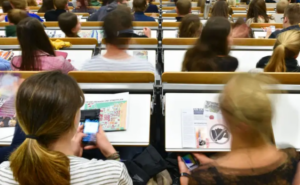Blogpost written by Julian Canaj and Kashif Khan
Are you experiencing fatigue and struggling to engage with the lecture content? Your phone discreetly vibrates, and suddenly, five minutes later, you find yourself immersed into TikTok, sneakily hiding your device beneath the table. Rest assured, this behavior is not unique. Extensive use of your smartphone can be part of the behavior called ‘procrastination’. Other aspects of it include a certain delay of tasks, sometimes even up to the point of having worse results in e. g. tests. Studies have found that scrolling through social media (=procrastinating) can not only be distracting but might also lead you to a “smartphone problem”.
Key Points
- Problematic smartphone use and the connection to procrastination
- Social media use as part of procrastination in lecture settings

People can develop a habit to delay their tasks to a future time. This practice is most common for tasks that are perceived as boring, difficult or unpleasant. The so-called procrastination is a problematic behavior which is linked to the additional stress and depression. In the modern digital world, procrastination is often perceived as scrolling in your smartphone while using social media.
Using social media platforms is amongst the main activities while using smartphones. Many people use the platforms to be constantly available and to connect online. While these are noble objectives, studies show that getting immediately little dopamine kicks through e.g. messages and notifications serve as a rewarding system and create a demand for attention.
Is it just a coincidence that similar features are also used to program gambling machines? Not at all.
The mentioned elements are purposely designed to keep the users engaged, making it difficult to stop procrastinating via social media, especially for individuals with lower self-control.
Additionally, the constant availability of smartphone technology make it easier to use them extensively. If the usage takes up a large amount of every day’s life and results in problems for other aspects of life’s chores, it can be defined as “problematic smartphone use”. This is defined by the fact that users create dependence on their smartphones and therefore negatively influencing their daily life.
More around the study!
The study in Computer in Human Behavior (2018) conducted by Dmitri Rozgonjuk, Mari Kattago and Karin Täht uncovered how the procrastination and problematic smartphone use are connected. To uncover this question, this relationship is being studied while using social media in lecture as a specific form of procrastinatory behavior.
How did they find it?
Three hundred and sixty-six Estonian students answered different questionnaires connected to smartphone addiction, procrastination and the social media use in lectures.
This research found that people that procrastinate usually engage in more problematic smartphone use, consequently leading them to have negative academic outcomes. As a result, procrastination is not only linked to the problematic use of smartphone devices, but also implies that it might be the root cause of problematic smartphone use.
Additionally, the authors revealed that procrastination is connected to the social media use in lectures. This fact is supported by the design features and behavioral habits formed from social media platform usage. As social media platforms are widely founded in smartphones, this can to a greater extent drive higher social media engagement in lectures.
Finally, an important discovery arises from the fact that the social media used in lectures, as a form of procrastination boosts even further the problematic smartphone use.
What does this suggest?
As the smartphone can be found almost in every pocket of the student, using social media during lectures takes away attention from the lecture itself, resulting in poorer grades for the student who procrastinates.
Brief conclusion
This paper discovered that social media use in lecture, as part of procrastination, is linked with problematic smartphone use. For you as a student, this study can help you handle procrastination better. Additionally, by addressing procrastination tendencies and guiding responsible technology use, educational outcomes can potentially be improved.
References:
Rozgonjuk, D., Kattago, M., & Täht, K. (2018). Social media use in lectures mediates the relationship between procrastination and problematic smartphone use. Computers in Human Behavior, 89, 191-198. https://doi.org/10.1016/j.chb.2018.08.003